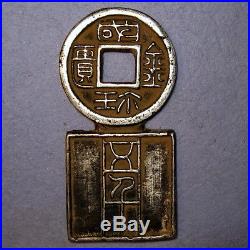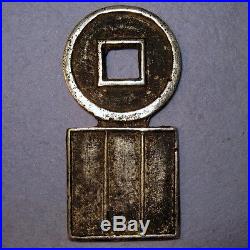

Xin Dynasty, Wang Mang, AD 7-23 Solid Silver, Guo Zhen Jin Gui – Wu Qian which means: National Gold Treasure, value five thousand. Inscription: Guo Zhen Jin Gui – Wu Qian. Which means: National Gold Treasure, value Five thousand. XIN DYNASTY Interregnum of Wang Mang, AD 7-23. The interregnum of Wang Mang was a very interesting time in Chinese history, but remember the old curse, “May you live in interesting times”. The exact dates and events that led Wang Mang to power differ a little between references, but for the time being we are using mostly those given by Robert Tye in his essay WANG MANG (paperback, 20 pages), but in a few cases, where noted, other dates may be used. If you are interested in learning more about this period and would like to read his essay, let us know and we will see if it is still available from him. About 47 BC, Mang was born into the most powerful family in China, a family that effectively ruled through a series of puppet Han emperors. He held a series of high governmental posts before becoming Minister of War in 7 BC, but fell from favor and retired two years later. Robert Tye records that in AD 3 Mang became father-in-law to the Emperor and, in AD 6, was appointed regent to the child Emperor P’ing Ti. This differs somewhat from the information recorded by Michael Mitchiner (in Oriental Coins and their Values, The Ancient & Classical World) who says Wang became regent to P’ing Ti in AD 1 but replaced him with Ju Tze Yung in AD 7 at which time Wang gave himself the office of Acting Emperor. Both sources agree that in AD 9 (January 10 according to Tye) Wang declared himself Emperor, establishing his “Hsin” (new) Dynasty. The China of Wang Mang’s day was one of extreme wealth and yet extreme poverty: a very few owned almost everything while the vast majority of people just barely survived. Wang set up a system very much like modern communism, and through a series of monetary and economic reforms confiscated the wealth of the elite, redistributing part of it among the common people. His first two coinage reforms, along with the nationalization of land in his economic reforms, succeeded in confiscating the wealth of the elite, transferring it to the state treasuries where it remained until Mang’s death when 150 tons of gold were found to be still in storage. He brought in a system to regulate prices, and his third coinage reform was intended to facilitate trade. None of this worked the way he intended and his fourth and fifth reforms seem to have been an attempt to undo the damage. In the end, he created a nightmare of political and economic upheaval that resulted in famines, anarchy and rebellions among displaced people. The last years of his reign were a period of chaos during which an estimated twenty-five million people died, about half China’s population. It must have been a very interesting time, indeed! As with many aspects of the early years of Wang Mang, there is dispute over his reign titles. So far we have found the following information, but it may not be fully accurate. The item “Solid Silver Guo Zhen Jin Gui-Wu Qian, National Gold Treasure value 5 thousand X” is in sale since Sunday, November 06, 2016. This item is in the category “Coins\Coins\Ancient\Chinese”. The seller is “best66666″ and is located in Amsterdam, Netherlands. This item can be shipped worldwide.
- Civilisation: Chinese
- Period: 7-23
- Country/Region of Manufacture: China
- Metal: Silver